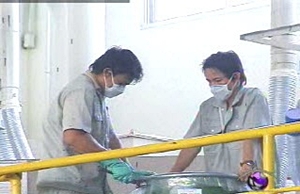BANGKOK, MARCH 29 — Implementation of the government’s Bt300 (US$10) national daily minimum wage policy, which will take effect Sunday (April 1) in the first seven provinces, is projected to help boost the country’s gross domestic product (GDP) by 0.5-0.6 per cent annually, according to the University of Thai Chamber of Commerce (UTCC).
Following activation of the new minimum wage, approximately 3.5-5 million labourers will earn more income–about Bt60 per day each, UTCC Economic and Business Forecasting Center director Thanawat Polwichai, told a news briefing on Thursday.

Some Bt7-9 billion (US$230-300 million), was expected to be circulated monthly, which will help spur the country’s economic growth by 0.5-0.6 per cent.
However, the higher capital cost due to the wage hike was likely to force entrepreneurs to increase goods prices by 5-10 per cent in the second half of the year, Mr Thanawat explained.
Dr Tanawat predicted that numbers of new jobs will be only slightly generated as entrepreneurs use more machines in order to offset the more highly paid labour force. Some industrial companies might relocate their production base in Thailand to low-wage neighbouring countries.
An impact of the minimum wage increase on overall employment could be realised in the next three years. Currently, around three million workers are still needed in various sectors, the academic said.
Dr Thanawat cited a recent survey by the centre among 1,237 respondents showing most of those surveyed had more debt owing to the higher cost of living and rising goods prices rather than last year’s flood crisis. About 61 per cent said the current cost of living was much higher than their increasing incomes and that ate into their savings.
He also raised concerns that workers earning less than Bt10,000 a month have had problems in repaying debt in the past year. With an average debt of nearly 170,000 baht per household and being obliged to pay monthly installments averaging nearly 11,000 baht—considerably more than their overall incomes.
The higher cost of living will negatively impact consumer confidence and the country’s overall economy thanks to less consumer spending.
Consumer worries about the growing cost of living, if they persist, means that economic recovery will not be possible in the third quarter as earlier expected, the UTCC academic warned.




